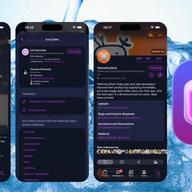Best App Analytics Tools you should know about
Introducing three app analytics tools to boost your app's success. With a focus on privacy, we help you make data-driven decisions!

In the dynamic world of app development, understanding your app's performance with the help of app analytics is more than just a necessity—it determines your success in the market. The growth of your business, as well as delivering a great user experience, depends on these factors. Do you use the best analytics tool for your business? This blog post introduces 3 app analytics tools for those who need data-driven insights—with a special focus on privacy-friendly tools!
These might be the big names you're already familiar with, or perhaps those are hidden gems that have managed to stay under the radar, waiting for their moment of recognition. We give you handy tips on what to look out for when deciding on the best-fitting analytics tool for your app and discuss their pros and cons. From analyzing user behavior to tracking key metrics, these tools empower you to make informed decisions, improving user engagement and driving growth. Let's dive right into our selection and say goodbye to being in the dark about your app's performance!

Google Firebase Analytics
Google Firebase Analytics is the best-known tool out there. It provides the means to analyze your app data and helps you understand user behavior. Still, the software is known to be restrictive in some areas, like user-specific analysis, being locked into Google Cloud, the NoSQL database Firebase not supporting relational database structures, and more.
Other features of Google Firebase Analytics are event tracking, user segmentation into behavior or demographic groups, real-time reporting with push notifications, funnels, crash reporting, A/B testing, and more.
It's been previously known that to use Google-related products, you mostly pay with the data itself. The same applies to Google Analytics for Firebase. Using Google Analytics for Firebase is free as long as you stay below certain thresholds for users and authentication processes per month. These thresholds are relatively high, which is great for small app developers and businesses, but your user's data eventually becomes the price to pay. However, due to Google's location in the USA, data privacy issues arise when using Firebase, especially following GDPR requirements. Using the tool for free means that Google can use your user's data for their own marketing purposes.
Read the story of Ryan, who rebuilt his popular gaming app for VisionOS and is gradually moving away from Firebase Analytics:

Transforming the cult game Blackbox from iOS to VisionOS
Ryan from Blackbox shares his views on app analytics and talks about Blackbox for Vision Pro.
Read the case study

Mixpanel
Mixpanel is known for its in-depth analysis of user behavior and focuses on user-level tracking. Specifically, Mixpanel enables tracking of users across sessions, devices, and platforms over time! Each user's actions or events triggered within the app are measured. The data is saved to user profiles and gives you individual timelines detailing each step a user took. This provides developers with crucial data about their user base and allows businesses to understand the user journey in-depth! Other features of Mixpanel are event tracking, user breakdown, funnels, retention analysis, A/B testing, data export, predictive analysis, CRM integration, and customizable dashboards.
While Mixpanel shines with its in-depth data analysis, it requires some knowledge to fully exploit its potential. The free tier has some restrictions and gives you up to 100,000 monthly active users, but many app providers find it expensive when exceeding the limit—especially after the enormous price increase in May 2024.
Although Mixpanel is based in the USA and follows local data privacy laws, Mixpanel offers data storage in European data centers on request.

Microsoft Visual Studio App Center (Sunsetting & Limited Analytics Support)
Microsoft’s Visual Studio App Center historically offered an all-in-one platform for building, testing, distributing, and monitoring mobile and desktop apps. However, as of March 31, 2025, the App Center service has been officially retired—developers can no longer sign in or make API calls, and most features (including automated builds, device testing, and app distribution) are no longer available.
Only the Analytics and Diagnostics components are being supported on a limited basis until June 30, 2026. During this period, you can still integrate the App Center SDK to collect basic usage data (such as session counts, custom events, and crash reports) and view aggregated analytics, but all other lifecycle services have been shut down.
Key points to include in this revised section:
- Sunset status: App Center has been retired; you can’t use login, API access, build automation, or device testing anymore.
- Analytics availability: Analytics & diagnostics are supported until mid-2026, primarily for legacy customers migrating off the platform.
- Migration guidance: If you still rely on App Center analytics, plan your migration to a modern analytics solution—such as TelemetryDeck—before support ends.
- Privacy notice: Because App Center is a Microsoft product, data goes through their cloud infrastructure, which includes US storage and processing. (Keep or update this based on your privacy positioning.)
Migration advice: With App Center’s broader platform retired, many teams are replacing its analytics and crash reporting with tools that continue beyond the 2026 cutoff. Some developers route event data into alternative telemetry platforms (e.g., Application Insights via custom pipelines) or adopt dedicated mobile analytics services.

App Radar
App Radar has a different approach to analytics than other services do: they specialize in App Store Marketing and how your app is discovered on the app market. They help you with the optimization of your App Store listing with the help of AI and keyword ranking. In their 7-day trial, you can test market insights, find the perfect keywords for your app, edit your App Store listings, and respond to reviews and ratings.
This can be of great help in promoting your app. In combination with a user- and app-data-based analytics tool, it can significantly improve your app's total downloads and active user base. App Radar stores its data in Austria, Europe. They commit themselves to the EU’s General Data Privacy Regulation (GDPR) and Austria’s own data protection law. Their prize model varies based on the number of keywords, number of apps, team size, and so on.

Segment (segment.io)
Segment provides you with a uniform SDK for either your website, mobile app, server, or even cloud apps. Their API then transforms and translates your data and provides it to a database or an analytics service of your choice. This method reduces workload by letting developers only work with one SDK instead of many.
On mobile, they offer libraries for iOS, Android (Kotlin), React Native, Unity, AMP, and more.
Twilio, the company behind Segment, says they commit themselves to the EU data protection laws:
Binding Corporate Rules (BCRs) are binding data protection policies that are approved by European data protection authorities after significant consultation with those authorities and enable multinational businesses, such as Twilio, to make intra-organisational transfers of personal data across borders in compliance with EU data protection law. BCRs function as a code of conduct for Twilio’s data protection practices, based on strict principles established by EU data protection authorities.
When you use Segment to send analytics data to third-party services, like Google Analytics and Co., you still need to make sure the data is processed under the current privacy laws and regulations.

TelemetryDeck
TelemetryDeck is our own app analytics tool, and we are located in Germany, offering lean and hassle-free implementation! As with any other analytics tool, TelemetryDeck offers standard metrics such as the number of users, sessions, device models, and operating systems. Using our query language, you have some control over what data you want to collect. We specialize in user protection and GDPR compliance, which we do by anonymizing the data when it's collected—on the user's own device! See how we compare to Google Firebase.
Other features of TelemetryDeck are custom dashboards, A/B testing, funnels, multi-platform support, lightweight implementation, and real-time analytics.
To use TelemetryDeck at its full capacity, you might require more knowledge and technical proficiency. But all your basic needs are fulfilled with our templates and query options! The high priority of data security and anonymization is a strength in terms of privacy, but it can be a limitation depending on the data you seek for more detailed user analysis.
Read the story of Thomas, an indie developer based in France, who tells you exactly how he is using TelemetryDeck’s usage data to make informed decisions about working on existing and upcoming features of his app:

TelemetryDeck helped me decide which features to support and which to let go
Indie developer Thomas, creator of the open-source Mastodon client Ice Cubes, uses TelemetryDeck to understand how people actually use his app — helping him decide which features to support and which to sunset, all without compromising user privacy.
Read the case study
FAQ
What are the key app analytics tools to know about?
Essential app analytics tools include TelemetryDeck, Mixpanel, Amplitude, Google Analytics, and Firebase, each offering unique features for tracking user behavior and app performance.
Why is app analytics important for mobile apps?
App analytics help understand user engagement, optimize user experience, improve retention, and make data-driven decisions to grow your mobile app successfully.
How does TelemetryDeck compare to other app analytics tools?
TelemetryDeck provides privacy-focused, easy-to-use event tracking with real-time data, making it ideal for teams seeking simplicity without sacrificing essential analytics features.
When should I consider switching to a new app analytics tool?
Switch if your current tool lacks features you need, if you require better privacy compliance, or if you want a more affordable, user-friendly solution for app insights.
Who benefits most from using these app analytics tools?
Mobile app developers, product managers, and marketers aim to enhance user engagement and optimize app performance through detailed behavioral insights.
Conclusion
With many app analytics tools to choose from, it's important to find the best fit for your business. In this post, we've introduced three tools that provide valuable insights into user behavior and key metrics, each with strengths and weaknesses. It’s also crucial to acknowledge how analytics tools value user privacy. While some understand the importance, others tend to see it lightly. Learn more about the importance of privacy by design in our blog post!
